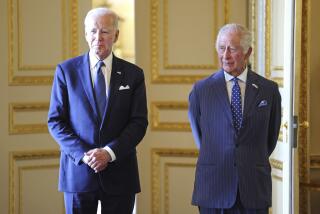Blair Agrees Iraq Is ‘a Real Threat’
LONDON — British Prime Minister Tony Blair on Thursday endorsed President Bush’s decision to take on states that accumulate weapons of mass destruction and suggested that he would back U.S. action against Iraq.
Blair stopped short of adopting Bush’s characterization of Iran, Iraq and North Korea as an “axis of evil”--a view that has been widely condemned in Europe--but said he shares the sentiment behind it.
“Those who are engaged in spreading weapons of mass destruction are engaged in an evil trade, and it is important that we make sure that we take action in respect of it,” Blair said in an interview with the Australian Broadcasting Corp.
“The accumulation of weapons of mass destruction by Iraq poses a threat, not just to the region, but to the wider world, and I think George Bush was absolutely right to raise it,” Blair said. “Now, what action we take in respect of that is an open matter for discussion.”
Asked if Britain was ready to use force against Iraq, he responded: “When we’re ready to take action, then we’ll announce it. It is a real issue. It is a real threat.”
Blair’s statements were his strongest to date on Iraq and appeared to be the opening salvo in an international campaign to rally support for military action against Saddam Hussein if the Iraqi president refuses to allow international weapons inspectors back into the Persian Gulf nation.
The prime minister played a similar role in the U.S. war to topple the Taliban government of Afghanistan and hunt down the Al Qaeda network accused in the Sept. 11 attacks on the United States.
Blair is expected to hold talks with Bush in Washington next month to discuss a plan of action against Iraq as part of a second phase in the U.S.-directed “war on terrorism.” He has repeatedly stated that there is no evidence of direct Iraqi involvement in the attacks on the World Trade Center and Pentagon, but he also has said that the spread of nuclear, biological and chemical weapons is a problem that must be tackled.
Britain is the only ally still helping the U.S. patrol the “no-fly” zones over the Kurdish north and Shiite Muslim south of Iraq. France pulled out several years ago. The zones were established after the Persian Gulf War in an effort to protect minority groups that had come under threat from Iraq’s government.
Bush’s “axis of evil” formulation--first put forward in his State of the Union speech in January--has come under heavy fire from Europeans. French Prime Minister Lionel Jospin has warned the United States not to give in to “the strong temptation of unilateralism.” Chris Patten, the European Union’s commissioner for external affairs, accused the Bush administration of a dangerously “absolutist and simplistic” stance toward global issues.
Many European governments are skeptical about Bush’s pursuit of “a regime change” in Iraq, while Russia and China have stated their opposition to a U.S. military campaign to topple Hussein.
Vice President Dick Cheney is expected to sound out Arab governments during an upcoming tour of the Middle East. Many Arab leaders fear a leadership vacuum if Hussein is driven from power, creating chaos in Iraq and spreading violence to neighboring countries.
U.N. Secretary-General Kofi Annan is to meet Iraq’s foreign minister, Naji Sabri, in New York on Thursday to discuss the possible return of weapons inspectors to Iraq. The U.N. inspectors were pulled out in 1998 after their movements were so restricted that they were unable to do their jobs.
On Wednesday, Annan said that “any attack on Iraq at this stage would be unwise.”
The British government reportedly is planning to publish detailed evidence of Iraq’s nuclear capabilities. The Observer newspaper reported Sunday that the document will reveal that Hussein is attempting to amass rudimentary nuclear capabilities and is seeking ways to launch “dirty bombs”--unsophisticated but deadly nuclear devices.
A spokesman for Blair said Thursday that Hussein is continuing to produce weapons of mass destruction and that the growing attention on Iraq is part of the “logical process” unfolding since Sept. 11. He described this as “follow-through” on the anti-terror agenda.
Not all members of Blair’s Labor Party agree. A poll of 100 party members in Parliament conducted by BBC television revealed widespread opposition to a military attack on Iraq, with 86 saying they would not support it.
In his television interview, Blair foresaw no hasty action against the Iraqi leader but said the weapons issue must be confronted.
“Heavens above, he used chemical weapons against his own people,” Blair said of an incident during the 1980-88 Iran-Iraq war, “so it is an issue, and we have got to look at it. But we will look at it in a rational and calm way, as we have for the other issues.”
Sources close to Blair say they believe the prime minister will support a military campaign in Iraq if the United States first exhausts diplomatic efforts, reengages in Middle East peace efforts and gets U.N. Security Council approval for its action.
More to Read
Sign up for Essential California
The most important California stories and recommendations in your inbox every morning.
You may occasionally receive promotional content from the Los Angeles Times.










